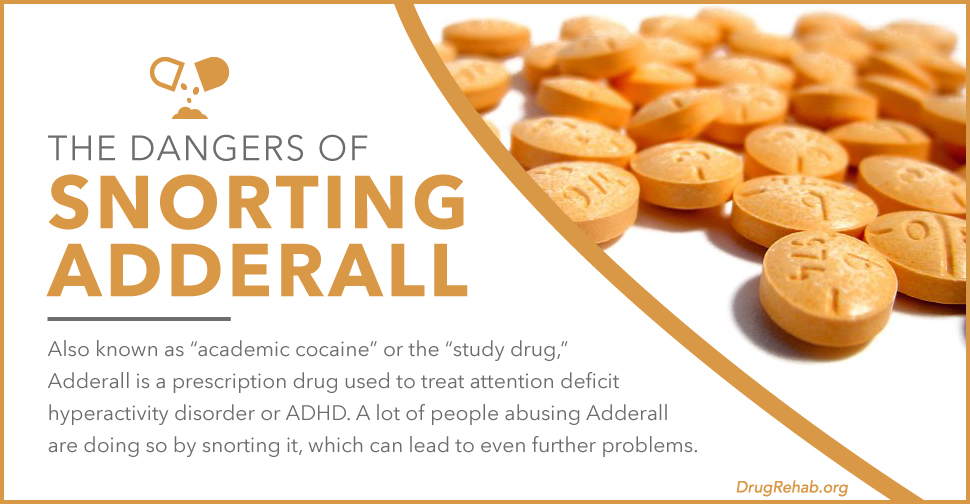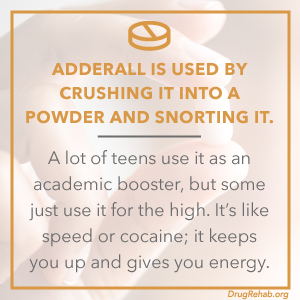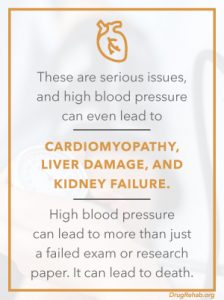
Also known as “academic cocaine” or the “study drug”, Adderall is a prescription drug commonly used to treat attention deficit hyperactivity disorder or ADHD. For the person suffering from a substance abuse or substance use disorder, Adderall can mean serious health consequences—including heart damage, brain damage, and sinus damage. A lot of people abusing Adderall are doing so by snorting it, which can lead to even further complications.
What is Adderall’s Intended Use?
Adderall is a prescription stimulant used to treat adolescents, teens, and young adults who have attention deficit disorder (ADD) or attention deficit hyperactivity disorder (ADHD). “People with ADHD persistently have more difficulty paying attention or are more hyperactive or impulsive than other people the same age. This pattern of behavior usually becomes evident when a child is in preschool or the first grades of elementary school; the average age of onset of ADHD symptoms is 7 years” (National Institute on Drug Abuse – NIDA). Both Adderall and Adderall XR are intended to be taken orally (in a pill form), but just like any other pill, there are various ways to abuse it.
Adderall can be abused by crushing the pill into a powder and snorting it. A lot of teens use it as an academic booster, while others use it just to feel “high”. It’s similar to speed or cocaine in that it keeps the user alert and gives you them extra energy. Addiction, and other serious consequences, become a possibility for an individual that is snorting Adderall frequently.
More About Addiction
For the general public whose using Adderall as a prescribed medication, “concerns have been raised that stimulants prescribed to treat a child’s or adolescent’s ADHD could affect an individual’s vulnerability to developing later drug problems” (NIDA). The truth is, they have nothing to worry about, and studies have proven this. But for the people abusing the drug, there is a pretty good chance that they’ll become addicted to Adderall.
“Addiction to stimulants is also a very real consideration for anyone taking them without medical supervision. Addiction most likely occurs because stimulants, when taken in doses and routes other than those prescribed by a doctor, can induce a rapid rise in dopamine in the brain” (NIDA).
Are you or a loved one suffering from addiction?
Don't wait, get the best treatment options today
Call Now: (833) 473-4227Why Do People Snort Adderall?
People snort drugs for various reasons. Some enjoy the numbness that snorting drugs gives them, and some people just like putting things up their nose; others do it for fun. When a person eats a drug or pops a pill it goes into their digestive system, and might take a bit of time to get into the bloodstream, which will eventually transfer it to the brain and heart.
When a person snorts a drug, it dissolves into the mucous of the sinuses and then straight to the bloodstream; thereby making the high almost instantaneous. The other ways to take Adderall are orally and intravenous—although snorting the drug is one of the more common methods of administration.
How Much Adderall Does A Person Snort?
Adderall usually comes in 12.5 mg, 15 mg, 20 mg, and 30 mg doses—so the amount that a person will snort depends on the potency of the pill. People who frequently use Adderall as a study drug will do a piece of the pill at a time to stretch it out. Though this really depends on how often a person is using the drug. A chronic user might try to spread out a single pill to avoid having withdrawals; whereas a novice drug user might take a larger dose out of inexperience.

According to the U.S. National Library of Medicine, “there are three general potential negative consequences of misusing study drugs. These include: potential for addiction, potential for reactions to high doses, and potential for medical complications.”
Health Problems From Abusing Adderall
Along with seriously messing up a person’s brain, heart, and sinuses—abusing Adderall (or using it any way other than its medical purpose) can lead to:
- Severe Anxiety
- Glaucoma
- Motor tics (or Tourette’s syndrome)
- Psychotic Conditions
- Depression
- Seizure Disorder
- History of Drug Abuse
- Narrowing of One’s Gastrointestinal Tract
- Damaging the Liver
(U.S. National Library of Medicine)
Snorting Adderall Effects On The Sinuses
There are a lot of different problems that can arise from sniffing or snorting drugs—some are long term and some can happen immediately. Snorting drugs often leads to random nosebleeds, sinus infections, a constantly runny nose, and can even erode a person’s nasal septum.
Snorting Adderall Effects On The Heart
A lot of stimulants can have serious consequences on the heart. “Most study drugs raise blood pressure and may place users at risk for heart attacks and stroke. For example, side effects may include irregular heartbeat and very high blood pressure” (U.S. National Library of Medicine).
These are serious issues, and high blood pressure can even lead to cardiomyopathy, liver damage, and kidney failure. High blood pressure can lead to more than just a failed exam or research paper. It can lead to death.
Snorting Adderall Effects On The Brain
An addiction is a mental disease characterized by a person’s inability to stop using a drug on their own. So when a person has become mentally and physically dependent on a drug and then tries to stop—they have withdrawals. Withdrawals don’t always happen after a person has build up a tolerance to drugs, but according to the U.S. National Library of Medicine, they are more likely with tolerance.
When abused prescription drugs can have adverse affects on the brain just like heroin, cocaine, alcohol, and methamphetamine. Adderall is the most similar to cocaine, because they are both stimulants. “When abused, all of these classes of drugs directly or indirectly cause a pleasurable increase in the amount of dopamine in the brain’s reward pathway. Repeatedly seeking to experience that feeling can lead to addiction” (NIDA).
Withdrawal Symptoms Of Adderall
Withdrawals from stimulants like Adderall typically include:
- Fatigue or Exhaustion
- Depression
- Unpleasant and Vivid Dreams
- Insomnia or Hypersomnia
- Increased Appetite
- Psychomotor Retardation
- Agitation
- Irritability
(U.S. National Library of Medicine)
Can Snorting Adderall Kill You?
Yes. If a person uses too much Adderall (which can vary between people) it can absolutely lead to cardiac arrest, and even death. This is why the amount that a person who actually needs the drug is closely monitored by professionals.
More About Adderall Abuse
There are several different ways to abuse prescription drugs, but some of the most common are—taking someone else’s medication, using more than a physician’s recommended dosage, and using a drug for anything other than what it’s intended (like studying).
Adderall is “often abused by students seeking to improve their academic performance. However, although they may boost alertness, there is little evidence they improve cognitive functioning for those without a medical condition” (National Institute on Drug Abuse). Are you suffering from an addiction to Adderall? Are you ready to get help?
How To Find Treatment For An Addiction
There are millions of people suffering from drug addiction, some of them carry on with their addiction with no idea whether or not they’ll overdose tomorrow. We are all here in this life for a short period of time—so let’s make the best of it. If you are reading this for someone you love, and don’t know how to help, contact us today. Addiction is a disease that we can help you with.
For More Information Related to “The Dangers of Snorting Adderall” Be Sure To Check Out These Additional Resources From DrugRehab.org:
- Adderall Abuse On College Campuses
- Playing With Fire: Study Shows Teens Abuse ADHD Drugs
- Amphetamine Abuse on College Campuses
- Drug Diversion in Hospitals by Professionals
- How Much Does a Drug and/or Alcohol Intervention Cost?
Sources
National Institute on Drug Abuse – Stimulant ADHD Medications: Methylphenidate and Amphetamines
National Institute on Drug Abuse – Prescription and Over-the-Counter Medications
National Institute on Drug Abuse – Misuse of “Study Drugs:” Prevalence, Consequences, and Implications for Policy




